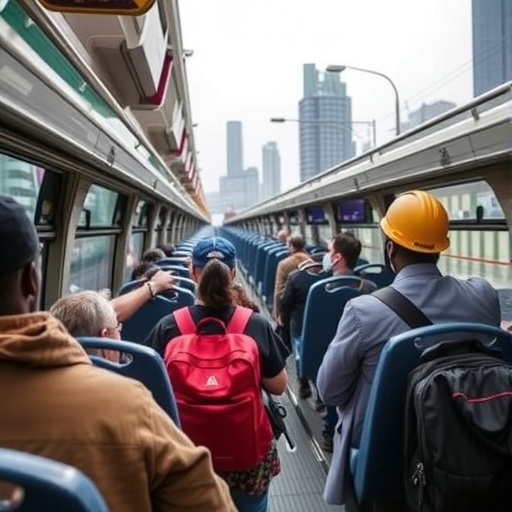Public transport serves as the lifeblood of bustling urban centers, facilitating the movement of millions daily. Yet, it harbors challenges that, if left unattended, can compromise not only the efficiency of the system but also the safety and security of its users. An insightful study conducted by Medayese, Akande, and Magidimisha-Chipungu delves into the troubling intersection between public transport safety and crime patterns in Nigeria’s two largest cities, Lagos and Abuja. This comprehensive examination sheds light on critical insights that underscore the pressing need for improved safety regulations and a commitment to tackling crime within these public transport systems.
In Nigeria, public transport is utilized by a significant proportion of the populace. The cities of Lagos and Abuja, in particular, showcase a diverse range of public transport options, including buses, taxis, and ride-hailing services. However, the challenges faced within these systems vary greatly, influenced by factors such as infrastructure, population density, and social dynamics. The research indicates that as urban populations swell, the stress on public transport systems intensifies, consequently leading to increased instances of crime and safety hazards.
In Lagos, for instance, the sheer volume of people reliant on public transport can create an environment ripe for opportunistic crime. Theft, harassment, and violent crime are persistent issues that significantly impact the commuter experience. The study discusses different crime patterns witnessed in Lagos’s transport systems, establishing a correlation between crime rates and specific times of day, locations, and types of transport used. This reveals not just a grim portrait of public safety but also the urgent need for targeted interventions.
In contrast, Abuja, as a relatively newer capital city, presents a different scenario. While the public transport system is not as extensive as that of Lagos, it does exhibit a unique array of challenges. The study highlights that crime patterns here can be attributed to a combination of factors including economic inequalities, a lack of robust law enforcement, and a less developed public transport infrastructure. Adding layers of complexity, issues such as vehicle safety and the threat of violence further complicate the commuter landscape.
Safety concerns are not merely theoretical in nature. They manifest in the everyday experiences of commuters, shaping their perceptions and influencing their behavior. Medayese and his colleagues explore the psychological dimensions of public transport safety, detailing how fear of crime can deter people from using these services altogether. The resulting decline in ridership can have devastating effects on the public transport system’s viability and the economic vitality of the cities themselves.
The researchers propose innovative solutions aimed at enhancing safety and reducing crime. Key among these is the use of surveillance technologies within public transport networks. The incorporation of security cameras and real-time monitoring systems can act as significant deterrents against criminal behavior. Furthermore, encouraging community partnerships with local law enforcement can foster a greater sense of security, ensuring that commuters feel safe while traveling.
Investment in public awareness campaigns is also crucial. The study advocates for educational initiatives that empower commuters with knowledge about safety measures and how to report crimes effectively. By fostering a culture of vigilance and community engagement, the public can play an active role in enhancing their safety and that of their fellow commuters.
Furthermore, the research suggests that urban planners and policymakers must prioritize the integration of safety features into the design of public transport systems. Well-lit stations, visibly marked routes, and the establishment of safe waiting areas can mitigate risks significantly. The physical design of transport systems plays a crucial role in shaping commuter behavior and addressing safety concerns.
While Abuja has its unique challenges, it also benefits from the opportunity to learn from the experiences of Lagos. The sharing of best practices between these two cities can pave the way for innovative solutions that enhance public transport safety on a national scale. Such collaborative efforts could involve knowledge exchanges between law enforcement agencies, transport authorities, and community groups.
At the heart of this issue lies the overarching theme of social equity. Public transport should ideally serve all citizens, but it often fails to do so when safety concerns disproportionately affect marginalized communities. Addressing the crime patterns and safety concerns in public transport is not merely a matter of improving logistics; it is about fostering an inclusive society where all citizens can enjoy equal access to essential services without fear.
This research into public transport safety and crime patterns in Lagos and Abuja highlights the need for collaborative efforts among various stakeholders, including government agencies, local organizations, and the general public. Collective action can drive the transformations necessary to foster safer, more reliable public transport systems, thus reshaping the commuting experience for countless individuals in these vibrant cities.
As urban centers continue to grow, the importance of ensuring that public transport systems remain safe and secure must remain at the forefront of policymakers’ agendas. Medayese and his team’s work emphasizes that the solutions to these pressing issues are within reach, requiring only the political will and community engagement to bring them to fruition.
To conclude, the complexities surrounding public transport safety and crime necessitate a nuanced understanding and a multi-faceted approach. The intersections of urban design, law enforcement, and community involvement present opportunities for impactful change that could enhance the public transport ecosystem in Nigeria’s largest cities.
Subject of Research: Public transport safety and crime patterns in Lagos and Abuja
Article Title: Public transport safety and crime patterns in Lagos and Abuja
Article References:
Medayese, S., Akande, O.S. & Magidimisha-Chipungu, H.H. Public transport safety and crime patterns in Lagos and Abuja.
Discov Cities 2, 95 (2025). https://doi.org/10.1007/s44327-025-00133-8
Image Credits: AI Generated
DOI: https://doi.org/10.1007/s44327-025-00133-8
Keywords: Public transport safety, crime patterns, Lagos, Abuja, urban transport, community safety, surveillance technologies, law enforcement, urban planning, social equity.




